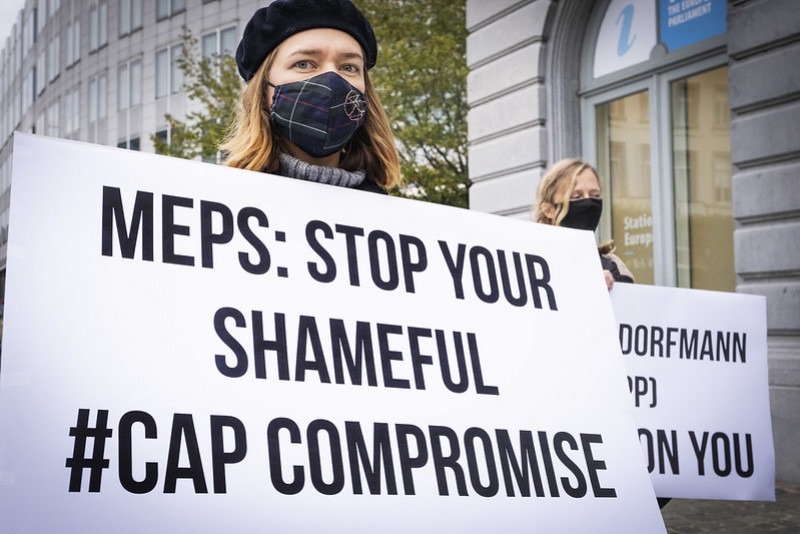The European Parliament has today voted on the new Common Agricultural Policy (CAP), in what Friends of the Earth Europe called a ‘historically bad week for the future of farming’.
A majority of MEPs voted against substantial improvements to the current harmful system, burying any hope of real reform of the 400 billion Euro funds to make them fairer to farmers or better for nature. [1]
Earlier in the week, Agriculture Ministers from the 27 EU countries also backed away from even moderate green goals, in favour of agriculture-as-usual. [2]
The outcomes are a major blow for the environment and farmers and will make reaching the goals set in the European Green Deal impossible, reacted Friends of the Earth Europe.
Stanka Becheva, food and agriculture campaigner at Friends of the Earth Europe, commented:
“This is a historically bad week for the future of farming. The decisions taken by parliamentarians and Ministers will put even more farms out of business and mean the EU can forget about fulfilling its Green Deal objectives.
“Millions of farms in Europe have already disappeared, and nature – without which food production is not possible – is in grave danger. We’ve got here as the result of the wrong policies and warped farming subsidies which mainly benefit a few industrial-scale factory farms. Now this failing system looks set to continue, spelling disaster for the environment and small farmers.”
Research published by Friends of the Earth Europe shows the CAP has contributed to the expansion of industrial farming methods and factory farms across Europe, and between 2005 and 2016 contributed to one in three small scale animal farms going out of business. Industrial farming has contributed to the decline of 41% of insect species, one-third of which are threatened with extinction. 75% of our most important food crops depend on pollination by insects.
As part of its Green Deal plans, the European Commission has adopted targets to dedicate 25% of agricultural land to organic farmimg, to reduce the use of chemical pesticides by 50%, and to give priority to biodiversity on 10% of agricultual areas, by 2030.
The lack of real reform of the CAP, which will now continue to distribute the majority of subsidies as untargeted direct payments per hectare, with weak environmental conditions, moves these goals out of reach.
The Parliament and member states will now enter negotiations with the European Commission to reach a final agreement on the new CAP in 2021.
From 1-31 October, the Good Food Good Farming Days of Action are taking place across Europe. Events, protests and actions are organised to call for a food and farming system which supports small farmers and rural livelihoods, protects soil, water, ecosystems and biodiversity, and does not contribute to climate change or increased industrial farming, and provides healthy food for all.
***
[1] Some key element of the agreement:- 60% of subsidies to be given as untargeted direct payments, majority of which are per hectare payments with weak environmental conditions
- Weakening of the basic environmental conditions for farmers who receive direct payments, e.g. protection of peatlands, grassland protection
- 30% of direct payments ring-fenced for eco-schemes, but enlargement of the scope of those to contribute also to economic objectives
- 35% of rural development to contribute to climate and environmental objectives, however inclusion in this support for things which don’t contribute to any environmental objectives (support for areas with natural constraints)
- No link between the CAP and the objectives of the European Green Deal
- Only 20% of the payments to go to eco-schemes under the first pillar; rural development funding for the environment could contribute to this target and the scope includes employment and growth objectives
- Watering down of conditionality by deleting a number of tools proposed by the Commission e.g. nutrients management tool & minimum share of land for nature of 5% (catch crops or nitrogen fixing crops)
- 30% of rural development budget to contribute to environmental and climate objectives, though support for areas with natural or other specific constraints will count towards this target
- Capping of payments for single recipients of subsidies should be voluntary for member states.







